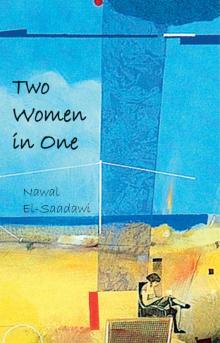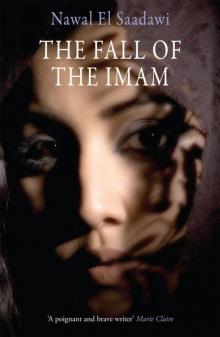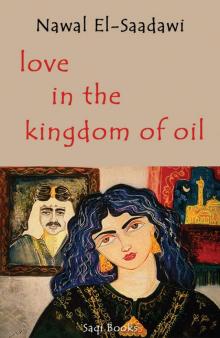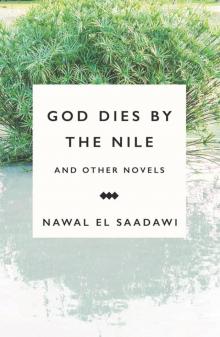- Home
- Nawal El Saadawi
Two Women in One Page 2
Two Women in One Read online
Page 2
‘Eternity’ was a word she had never understood. One day after another, the blood flowing in her veins following the cycle of the moon, the cell swelling within her and bursting at the very same instant. The tiny egg spun madly like the earth on its axis. With one eye, she would gaze at the universe seeking to annihilate herself, but in vain, the same vain frustration every time, with each futile cycle of the moon. Anger mounted within her like warm blood. It gathered, rose, and rotated in a cycle of its own within the domain of her body. She felt it unmistakably in her cells, an insistent, nagging feeling, telling her that one day, one given, fateful day, something momentous would happen to her.
She had never used a diary. Nor did she look at the calendar hanging in her father’s room, the one she always saw him consulting as he peeled off the passing days. Every morning he would tear off a day in the same way and with the same motion, scrunching it into a ball between his fingers, but she would pull it out of his hand, shouting, ‘Stop! Leave it alone!’ This time, before he had raised his large hand from the sheet of paper, she thought she had made a mistake, that the sun was not shining any brighter than usual, that her mother’s eyes were as always, and that the strange feeling that had come over her was just another of her many assorted illusions. She waited for her father to tear off the sheet of paper as usual, but this time he stopped. Instead she heard his voice behind her saying, ‘Happy birthday, Bahiah.’ She turned, saw the figure 4 on the white sheet of paper, and the blood drained from her face.
She looked around her as she walked down the street. When she heard a voice behind her, she stopped and turned as though someone had called her name. Suddenly she realized that the voice was calling a different name, one that happened to rhyme with hers, something like Kufiah, Najiah, Aliah or Zakiah.
On the tram she felt someone riding behind her, following her. When she got out at Qasr al-Aini street she imagined she heard his steps. As she went in through the college gate, so did he.
But she lost him in the spacious, crowded grounds. Voices and features intermingled and she felt as if she were sinking in the sea alone, with no one to see or recognize her; her face had become just like her fellow students’, so that there was no difference between Bahiah, Aliah, Suad and Yvonne.
At that moment she grasped the meaning of death. She had been searching for death in the corpses laid out in the dissecting room. But death is like life; it dwells not in corpses but only in a living brain, a brain fully alive and able to detect the slightest nuance, the most deeply hidden and intimate sensation: like the feeling of loss experienced by a particle of air floating in the universe and resisting being lost among millions of other particles; or the suppressed desire of a drop of water resisting dissolution in the sea, that desperate, insane resistance at the peak of frustration which breeds complete submission like eternal silence. Anyone looking at her face at that moment would have thought her blind and dumb; her body seemed still, even though her feet moved mechanically over the ground. Everything had the same colour and shape to her. All bodies were similar, and all gestures and voices. She found herself running aimlessly, fleeing the college grounds, fleeing the deadly sameness within and without, inside her body and in the outside world.
She had her own favourite, secluded corner, opposite the college fence, behind the huge building. She would sit there on a wooden stool, leaning forwards, gazing at a patch of earth the size of the palm of her hand, where no green grass had ever grown. Unlike the rest of the earth around it, this furrowed patch was always mud-coloured, and between ridges, millions of tiny, ant-sized creatures were always coming and going.
‘Bahiah’.
The name sounded as if it belonged to someone else. She leapt up from her stool. As she did, she realized that she had a body of her own, one she could move and shake without other bodies moving and shaking. She also had a name of her own, and when that name was called she would look up in surprise. She might even ask, ‘Who’s that?’ She got a shock every time she heard her name and a hidden feeling would tell her that someone was calling her own name, selecting her from among millions of other bodies, singling her out among the billions of other creatures floating in the universe.
The blood drained from her face. She became deathly pale, like a ghostly stone statue or the faces of the corpses lined up one after the other on marble tables in the dissecting room. She looked at the colour of her face in the mirror in the women’s room, and when her fingers touched her forehead, they were ice-cold. She knew she was trembling, and she wanted to escape the voice that called her, that summons issued directly and specifically to her, that miraculous power that was able to pick her out among all the others. She wanted to escape. With unaccustomed speed, she ran and hid among the crowd of girl students, her body disappearing among theirs. When their heads moved, so did hers — right, left, backwards and forwards. They protected her like a shield. There she stayed, hidden among them, unable to venture out. For outside was a supernatural force, capable of picking her out of crowds, and of distinguishing her body from others. A dreadfully potent force. The moment her head showed, this force would pull her with a magnetic power stronger than gravity. Once it had drawn her into its electromagnetic field, she would spin madly and helplessly in its orbit until the revolutions destroyed her.
She sensed that danger growing ever greater within her, a danger that threatened inevitably to destroy her. She felt as if a germ lived inside her, eating her body away cautiously and quietly, gradually destroying it; or that her body would suddenly be crushed under the wheels of a bus, or on the tramlines, and no one would come to her rescue. When she heard a cry and leaned her head out the tram window to see a body torn to shreds on the rails, she felt that the body was hers, the pale face hers, the red blood spattered over the tar her own. But the tram moved on again and she found her body where it had always been, intact on the seat. Her blood still flowed through her veins: it had not gushed out. A hidden certainty told her that the day had not yet come, that she was still Bahiah Shaheen, hard-working, well-behaved medical student, daughter of Muhammad Shaheen, superintendent of the Ministry of Health.
She entered the college just as she did every day, headed for the lecture hall and took her usual seat, the last in the back row on the left. Anyone would have thought she was fast asleep, but in fact she was wide awake, seeing the male students more clearly than ever before. She watched them push through the door, treading on each other’s feet, their bags under their arms bulging with anatomy books. Left hands clutching their precarious spectacles and right hands stretched out to push other bodies out of the way. They raced for the front seats in the lecture hall. Panting and out of breath, they grabbed their seats and opened their notebooks with fingers red and swollen from the fight to clamber on to the tram. Giving their fingers a quick rub, they thrust them into their pockets. A student might bury his head in his notebook to revise previous lectures, or crane his neck left or right to whisper a joke (usually obscene) to a classmate. When the lecturer arrived, a hushed silence fell over the hall. Each student could hear the rumbling of his neighbour’s empty stomach. The lecturer stepped slowly and quietly to the podium. His voice was quiet and his body too, his limbs relaxed and his cells secure, basking in the kind of reassurance felt by the stomach after a good meal, or the buttocks after relaxing in a comfortable chair. The students closed their eyes and dreamed of this relaxation, this self-assurance. They realized it was the fruit of a childhood dream, born when they first saw the gleam in their fathers’ eyes at the mere mention of the word ‘doctor’.
She would sit in the back row, not seeing their eyes, only their backs, as they pored over their notebooks. She imagined them permanently hunched and doubled over and was almost surprised to see them move about at the end of the lecture. They would jump up and rush for the door, tripping over each other and elbowing each other out of the way. When an elbow edged sneakily into a girl student’s breast, her lips would part almost imperceptibly. With an inaudible sup
pressed whisper the girl would say ‘Ah . . . ’ and place her bulging satchel protectively over her chest. The touch of the soft breast would pass like a serum from elbow to shoulder to neck. Muscles contracted, features froze and eyes became taut as a rope stretched to its breaking-point: seemingly static, while its inner cells tremble invisibly in a mad, violent movement against the pull. The eye muscles twisted towards anything that had the softness of flesh, whether breast, bottom, or leather satchel. Each male student would unconsciously take a bite of his satchel and chew it. When he realized that it was only leather he would flush and try to hide the holes all over his bag with the palms of his hand. In the tram he could not stand it any more. He would find himself inadvertently pressed against some woman’s breast. At midnight he would close his anatomy books and go to bed, but the body would refuse to sleep, for the stimulant would have congealed like the tip of a boil needing only the slightest touch to burst.
She didn’t like the male students. She didn’t like the way they rushed through the door with their thick glasses, straining eyes and angled elbows. She did not like the way they grabbed the front seats, showing her their bowed backs and exposing, above their white collars, their porous brown skin with its stubble and with the tiny imperfections scattered like sores.
She would look and then whisper something to a girl student, who would gasp with that suppressed feminine laugh and say, ‘Oh, come on, Bahiah, start thinking about your future.’
Some hidden insistent feeling told her that her future did not lie in those long, boring lectures, nor in getting a medical degree and hanging a shingle in the square saying ‘Dr Bahiah Shaheen’, nor in settling her ass in a comfortable seat behind the wheel of a car. Something told her that all this was meaningless, like a blank sheet of paper or a dark night without a single star, as if the whole world had become black or white, it really didn’t matter which, so long as it was all one colour.
It was then that she realized the absurdity of the world around her, of life, of the lecturer posing with a cigarette drooping from the corner of his mouth, of the bowed backs and those spotted necks.
She put her books and notebooks in her satchel, edged out of her seat and left through the back door of the lecture hall. She was on her own in the spacious college grounds. Moving her legs freely in her usual gait, she asked herself what she wanted to do with her life. She left the question unanswered; it hung in the air before her swinging slightly like a pendulum. She stamped the ground hard with one foot and realized that she wanted to do something concrete with her life, something definite. She could do it with a pen-point on a blank sheet of paper; she could touch it with her fingertip just as certainly as she could touch her body, feeling its external boundaries under her clothes, just as she could distinguish it from all the other bodies and lift it from the ground by moving her feet.
In her small bedroom, she gazed up at the ceiling. She saw herself sitting on her small red chair at her red desk, on which lay her notebooks and her textbook with its blue cover and white label. Name: Bahiah Shaheen. Subject: 1st Year Anatomy. She tore a clean sheet of paper from her exercise book. With a movement of her small hand, she drew a clear line with the nib of her pen, a line whose shape she recognized as her own. She knew too that the hand was hers, and the fingers around the pen. She could will them to make her distinct lines on the blank page, drawing a full circle and two smaller circles inside it — making a face and a pair of eyes glaring up from the white paper, a pair of wide black eyes like her own, staring at her woman to woman. She looked at her lines on the sheet of paper as carefully as she would look at her own features. She knew them as she knew her own face, never confusing it with other faces. She could distinguish her face and touch the lines on the paper with her finger, with the same certainty with which she would touch her own body and feel its external boundaries under her clothes.
Her father opened the door and she slipped the piece of paper under the textbook. But his large fingers picked up the book and extracted the drawing. He slapped her small hand with his broad palm and said, ‘What do you mean by wasting your time scribbling?’ He crumpled the sheet of paper and tossed it into the dustbin.
When he left she glanced at her familiar, crumpled drawing lying in the rubbish. She stared at it for a long time, just as she gazed at her face in the mirror. Then she pulled out a fresh sheet of paper and with determination she drew her lines, her invisible electric wires of fine silken threads, the colour of air, linking her with the drawing on the white sheet of paper, affirming her ability to distinguish the movement of her hand, the shape of her fingers, the length of her nose and the black of her eyes.
When she heard her father’s voice as he sat in the salon slumped in his Asyut-style chair, she hid the piece of paper under the textbook and began to read aloud, in a voice that rang in her ears like somebody else’s. The name on the cover seemed strange to her, as if it was the name of some other pupil, docile and obedient, doing what she was told, getting on with her homework and concealing her real self in the folds of the hidden sheet of paper.
Ever since she first became aware of life, she had wondered why all the things she loved were taboo. Even food — the stuff they made her eat was the kind she hated most. Her mother shovelled it into her mouth and as soon as her back was turned, Bahiah spat it out. Her father hated her drawings. Let him see her take a sheet of paper and he would tear it to shreds or crumple it up and throw it out with the household rubbish.
Her father stood like a vast, high barrier between her and her real self, blocking her way, guarding the entrance to the house with the bulk of his body, his loud coarse voice, huge palms and wide eyes. When his voice rang out, calling her name, she felt he was calling somebody else but she would answer anyway: ‘Yes, father.’ ‘Have you done your homework?’ he would ask, and she would reply politely and obediently, ‘Yes, father.’ When she heard the word ‘yes’ she realized that the voice was definitely not her own.
Only when her father had vanished from the salon and she felt alone in her room could she hear her real voice. She could distinguish its features and tone just as she could define the features of her own body. Her thin fingers removed the white label bearing the false name on the blue cover. As the nib of her pen moved over the white page, she defined things as she really saw them. When she drew her father, she gave him two red eyes and a black handlebar moustache, huge hands and fingers coiled round a long stick.
Her father did not have a black handlebar moustache. But on her way to and from school every day, she would see the policeman in his street-corner wooden shelter. All she saw of his face was a black handlebar moustache. She always quickened her step when she passed him, and sometimes ran home without stopping. The long stick was the one that was shaken at her every morning as she sat at her wooden desk in the classroom, the teacher’s voice ringing out as sharply as her father’s: ‘Bahiah Shaheen. Have you done your homework?’ At first she thought the teacher was calling somebody else and she pursed her lips in silence, but the sharp voice would ring out once more: ‘Bahiah Shaheen!’ Then she would jump up and reply with that polite, obedient ‘Yes, Miss.’ Friday was the only day she really liked, since school was closed. She would slip out of her narrow bed and onto her red chair, tear a sheet of paper from the middle of her exercise book, take her pen in her small fingers and move her hand over the page, drawing her lines. Sometimes she would take from her bag a red, blue or green pencil that she had bought with her pocket money from the shop near the school or borrowed from a classmate. Then she would colour in the drawing. She gave the tree green leaves and the sea blue water; blood she made red. How did she know that the colour of blood was red?
The first spot of red blood she had ever seen was on her small, white knickers. She would draw that spot like a deep red circle in the middle of the blank sheet of paper. The young girl’s eyes were large and frightened. Her body was small and thin like a sparrow’s trembling behind a wall. There were also many staring eyes, li
ke full circles. With her small swollen fingers, she buried her knickers in a hole behind the wall. She walked out in the street without knickers. The cold wind passed between her legs, billowing her dress, but she pulled it down firmly with both hands, defying the wind. She walked along the tarmac street, her bag bulging with books.
As she neared the wooden shelter, a deep red drop of blood trickled down between her legs and onto the asphalt. It lay on the ground in a red circle that widened to grow as big as the sun. The policeman with his handlebar moustache stared at her. He poked his nose out of the shelter, sniffing the blood. She threw her bag to the ground and ran home breathlessly.
She moved her head across the pillow heavily and saw the leather bag, bulging with anatomy books, on top of her desk. Above the desk were notebooks, a skull and a mug of water with a red rose in it. Glancing out of the corner of her eye at the calendar hanging on the wall, she remembered that she had an examination. She spread out her lecture notes and books and sat gazing at the skull. It was the skull of someone who had died some years ago. She had bought it from the dissecting room attendant for three and a half Egyptian pounds. The year before it would have cost just one pound, but prices had gone up and corpses were scarce and now fetched black-market rates. The undertaker, dissecting room attendant and cemetery guard had formed a partnership. When some unknown person with no next of kin was run over by a tram and killed, the undertaker would immediately appear, followed by a ‘father’ hired by the hour. The ‘father’ would throw himself on the dead body and weep crocodile tears. He would then sign for the body, which was released to him as his personal property to do with as he wished, just as a father owns a son and can do as he likes with him.

 Two Women in One
Two Women in One The Fall of the Imam
The Fall of the Imam Love in the Kingdom of Oil
Love in the Kingdom of Oil Zeina
Zeina God Dies by the Nile and Other Novels
God Dies by the Nile and Other Novels